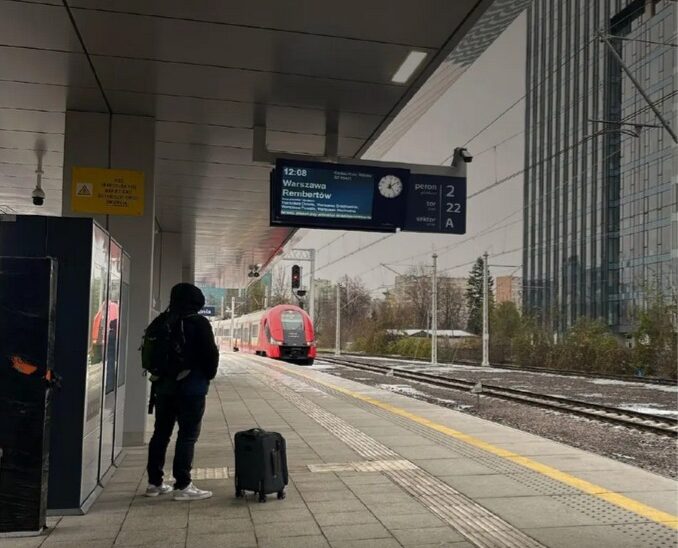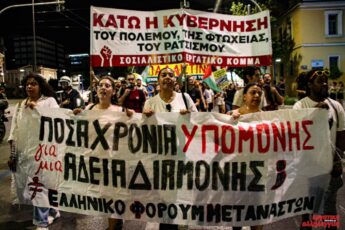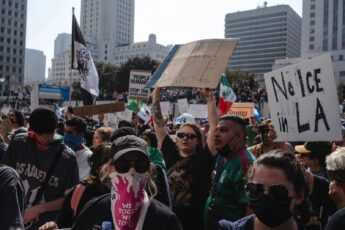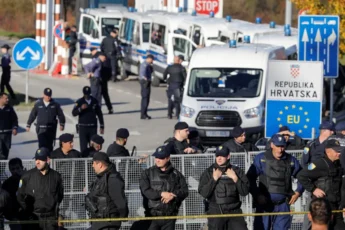
We are publishing an interview by Matilde and Laura from TSS and TMC, with Rocio and Vanessa, members of The Union of Latin American Workers in Poland, which began its work together with Inicjatywa Pracownicza in November 2023, in response to the large influx of Latin American migrants arriving in the country, often at the mercy of abusive companies, recruiters, and/or agencies.
Since the beginning of the war in Ukraine, the withdrawal of many Ukrainian workers called up to fight has required the recruitment of large numbers of migrants from Latin America and South Asia. The war has led to increasingly racist policies in Poland, driven by the government of Donald Tusk, which in March adopted a law allowing Polish authorities to temporarily suspend the right to asylum for migrants entering the country through Belarus.
In recent days, Poland has reinstated border controls with Germany and Lithuania, suspending Schengen rules in response to similar measures imposed by Berlin over a year ago, aimed at minimizing the flow of migrants.
The rise in racism, institutional barriers to the right to strike, and unbearable working conditions – as shown in another interview with Bartek Kurzyca from the Inicjatywa Pracownicza (Workers’ Initiative) labor union – offer migrant workers arriving from Latin America nothing but exploitation. In recent days, a violent act committed by Latin Americans was used by nationalists as a pretext to take to the streets and target not only Latin Americans but also foreigners in general. Many Colombian workers reported being fired from their jobs simply for being Colombian, and others have been harassed in the streets. As Rocio and Vanessa explain, many arrive through agencies that, after charging significant fees, do not take responsibility for regularizing their legal status. Instead, exploiting the blackmail of residence permits and housing, they force migrants to accept any wage, shift, or working condition. Some are given only one alternative: enlist in the Ukrainian army. Against this regime of racist exploitation, where workers are paid even less than Polish wages, already known for attracting many offshored European industries, the Union of Latin American Workers is organizing and working to reach more and more workers.
TMC: We have read the booklet published last year in collaboration with Inicjatywa Pracownicza about the conditions of Latin American workers in Poland. We saw that the number of migrant workers – especially from Colombia – has skyrocketed in recent years, increasing fivefold. Is there a connection with the war in Ukraine, given that many Ukrainian male workers had to return home to join the army?
STLP – Rocío: Yes, since 2022, the number of Colombians arriving in Poland has kept growing. Poland became well known in our countries mainly because, in theory, the legalization process was supposed to be easier here. These rumors spread quickly on social media across Latin America. Recruitment agencies claimed they would provide all the necessary documents and jobs with fair conditions, but the reality is completely different. Some agencies were even advising people not to get a visa. One of our union members, for example, was given two choices: come with a visa, or come without one. Without a visa, the agency said it would be faster and cheaper. So he chose that option, thinking it would be easy, especially since they promised accommodation and transport. Generally, Latin Americans can enter Poland as tourists without a visa. If an agency or employer offers a work contract and a work permit, the worker can then apply for a residence card before the 90 days of legal stay expire. There are even scam agencies recruiting people directly in Colombia. When the workers arrive in Poland, the agency either disappears or blocks their phone numbers after taking their money and offers no job at all. While most of the agencies are Ukrainian now and extremely racist, the recruiters are usually Colombians or from Latin America. In my case, when I arrived, I started working at a chicken processing plant named Plukon. They didn’t provide any documentation. We were working over 12 hours a day, and if someone didn’t comply, they were told they had to leave the accommodation, which was also provided by the agency. When I asked for my salary, a man from the agency threatened us with a gun. So we went to the police and filed a report. Eventually, an organization here in Wrocław called Nomada helped us. They brought us to the Pobo community center, and we started looking together for another job. In my case, I was lucky; I’m Mexican, so I have more legal options. I can leave and re-enter the Schengen area, and that makes a big difference. But for my Colombian friends, it’s much harder. Many of them have worked for 90 days without knowing they had to apply for a residence permit during that time. This happens all the time. It’s a huge problem. And if the immigration agency finds you without the proper papers, you get deported immediately. A member of our union changed his address and updated it one week before he was notified to give his fingerprints for the residence permit. As a result, the process was immediately cancelled. Here in Poland, once your application is cancelled or you fall into irregular status, there is no way to become legal again – unless you get married, and that’s the only option.
TMC: You mentioned that Ukrainian agencies are the ones that organize your travel to Poland. Do they try to bring Latin American migrants to Ukraine as well, or just to Poland?
STLP – Vanessa: Well, there are Colombians in Poland living in such desperate and terrible conditions that they end up accepting offers to go and fight in Ukraine.
STLP – Rocío: Julio, for example, was living near Wrocław. He had military experience in Perú and fought in Ukraine a few months ago. He later tried to change his life and came here to work, but had a very bad experience with a recruitment agency. Then he got another offer to return to Ukraine – it was very easy. They offered him around 10,000 zlotys (about 3,000 euros) to go and fight, and promised things like European citizenship and compensation for his family in case something happened to him. Of course, none of that was true. He was recruited by a Ukrainian contact who typically accepts people with some kind of military or police background, or at least basic training. This is quite common, especially among Colombians in irregular situations, for whom this becomes a last resort. Julio was living in awful conditions here – he was basically homeless, sharing a space with several other people. He allowed us to share videos of what he experienced, because he wants people to know what’s really happening.
TMC: What is the role of the employers in the procedure to obtain a residence permit?
STLP – Rocío: The employer is supposed to request a work permit from the local government office. But usually, we don’t work directly for companies; we work through employment agencies, which act as intermediaries for companies such as Shein, Realme, Colgate, and Tarczyński. The problem is that these agencies end up having almost total control over the legalization process. Many of them even charge workers for handling the documents. If you don’t pay, you can’t stay. So workers feel forced to go through these agencies, even though technically it would be possible to handle the process on their own. But in practice, it’s very hard to do it yourself: all the information is in Polish, the procedures keep changing, and it’s really confusing. That’s why people usually need to hire a lawyer, go through an agency, or come to organizations like ours for help.
STLP – Rocío: We have a friend who’s currently undocumented, and her employer told her she can’t quit her job: if she does, he’ll call immigration on her. She’s being underpaid, and she doesn’t even get paid on time. In another case, workers were told to do 12-hour shifts instead of 8. When we refused and went home after 8 hours, someone from the agency followed us home, and a man even pulled out a gun. It was a clear threat to force them to keep working.
STLP – Vanessa: Legally, with the kind of contract we usually have, we’re allowed to work 8 hours per day. But agencies often make people sign extra documents, separate from the official contract, saying they agree to work 12 hours a day, compulsorily. So you don’t really have a choice about overtime. If you refuse, you get fired – and since most agencies also provide the accommodation, you can end up on the street immediately. And this happens even in winter, which in Poland is especially harsh. Last December, for example, one agency had hired maybe ten or more Colombians near here. Then one day, all of them were suddenly fired, and they had to find a new place to live in the middle of winter. If we lose our job, we have 15 days to get another one, to keep our work permit.
STLP – Rocío: When you lose a job, you have two weeks to find another one and notify the government office. But this is basically impossible, because getting a new work permit takes more than three months, and here in this city, it can take six or even seven months. If you work without a valid work permit, you’re considered irregular, and your work is illegal. So, in practice, it doesn’t make sense. The only way people manage is by playing with the timing of the process to buy themselves some room. Right now, the full legalization process can take one or even two years. For example, if I’m called to give my fingerprints, I can switch my case to another municipality. That way, I can gain six months or even a year, because the bureaucracy restarts. This happens often, especially because people can’t handle the conditions in their current jobs, so they leave, change employers, and jump from one job to another. As a result, many people’s processes stretch over two, three, or even four years, and during this time, you’re not allowed to leave the country, to visit your family, or even apply for certain jobs if you don’t have the card.
STLP – Vanessa: I forgot to say that some agencies, more than a few, are now offering, or in some cases forcing people to apply for residence as students. If you don’t accept, you lose your job. Yesterday, we were looking at the names of some of the schools they use, but they’re completely fake.
STLP – Rocío: Yes, they do this to avoid the work permit process, because even though the cost is relatively low, just over 100 zlotys, they want to avoid both the payment and the long wait times. So, instead, they enroll people in fake schools to give them student status. That’s because here in Poland, as long as you have student status, you’re allowed to work freely in the labor market.
TMC: Has the increase in border violence ordered by the Polish president Tusk, resulted in a rise in racism within the country as well?
STLP – Rocío: Yes, in the past few months, we’ve seen an increase in inspections by the border patrol, especially in factories. There’s been a lot of news about mass deportations, not only of Colombians, but of many people working irregularly. Even if you’ve been waiting a long time for your residence permit, you can still be detained – sometimes for a day or more – until they “verify” your status. Then, in many cases, they simply say your process has been cancelled, and you’re ordered to leave, even if your application is still active. This has been happening more and more. Just in the past two or three months, a union member of ours experienced this. That’s why we started organizing a kind of SOS response group, to help people in emergencies like this, because it can happen any time, day or night, and it’s essential that the person at least has access to a lawyer. In that specific case, it didn’t even happen at the factory: they came to his house.
TMC: How did you start organizing? You mentioned the SOS helpline – what about the union itself? When and how did that begin?
STLP – Rocío: We started in November 2023, exactly two months after we arrived here. A group of us – Colombians – had gone through that experience in the chicken processing plant. The idea came from Freddy (now STLP), Tomek from Nomada, and Magda from IP. They asked if we wanted to create a labor union, because it was clear that we needed to start informing people and trying to get organized help. That’s really how it began. It started when more and more people began reaching out to Nomada with labor-related issues, something they hadn’t dealt with so much before. Freddy, being Colombian, was able to connect with people from South America. We approached IP because we’ve known each other for many years – through Nomada, people from the association, like Tomek, and through social centers, squats, and previous activism. IP was invited to a meeting with the workers who had come to us with labor concerns, and that’s where the idea of forming a commission came up – a group of people who would support one another and meet regularly. However, the law gives us very few rights or protections, so the commission is quite fluid.
Workers’ rights in Poland are limited. We can’t even file a formal complaint with the labor inspectorate: if you’re undocumented, you have no rights. All kinds of demonstrations require permission, even the 8th of March women’s demonstration. Last year, we actually did have a small strike at the government office, to draw attention to the fact that workers there weren’t speaking English – even in foreign offices – and they wouldn’t let us use a translator. But it worked. The next day, they assigned someone who spoke English, and they also fixed the ticketing machine for appointments. It’s still not efficient, but at least it functions now.
STLP – Vanessa: There was also some interest in organizing a union at a meat factory in Lower Silesia, specifically a Latin American workers’ union. We discussed it with the IP, but there’s a problem: here in Poland, there are two types of employment contracts – one better and one worse: Umowa o pracę” (employment contract) is considered the better contract in Poland because it provides basic workers’ rights and protections, such as paid holidays, sick leave, notice periods, overtime pay, and pension contributions. However, most migrant workers – and many Polish workers too – are hired under a mandate contract (umowa zlecenie), or so-called ‘civil contract’, which is often misused by employers to avoid paying for basic labour rights. To legally form a union, you need at least ten workers with a better contract. You can set up a union commission, which would function more like an association, without significant rights or powers in workplaces. This is the model that many migrants from the Americas are currently using. If you have 10 people employed by the same employer (meaning the same company signs the contracts – not an agency or intermediary, as those count as different employers), you gain the rights provided by the law.
TMC: Are you in contact with other migrant organizations, either in Poland or elsewhere in Europe?
STLP – Rocío: Recently, I started connecting with a women’s collective in Spain through my work with PICUM. I met them two weeks ago, and they offered help. We’ve also made contact with people in the Netherlands. Here in Poland, there isn’t much from Latin America. There is a large women’s group called Latinas in Poland, but most of their members are here under different circumstances: they came to study, or have jobs in IT, or are married to locals. So the context is very different. There’s a language school group that brings together women from different parts of the world: Nigeria, Ukraine, Kyrgyzstan, and more. It’s a diverse group, and there could be potential to connect with them, too. I think we can find ways to work together, especially around labor rights for migrant women, because many of them are also workers. We’re trying to build something, though it’s all new here in Poland, and the situation is very complex.





